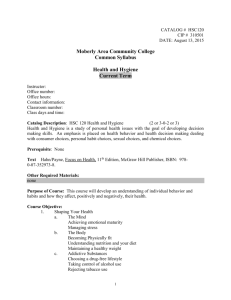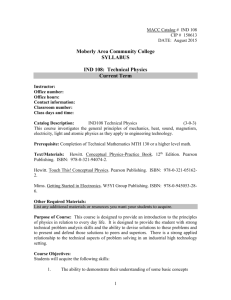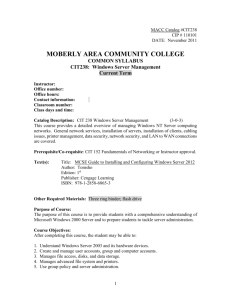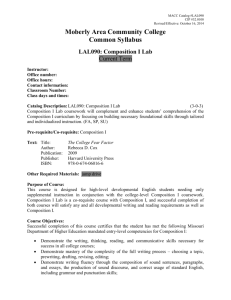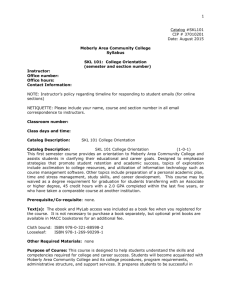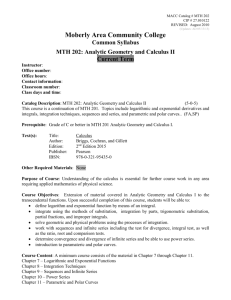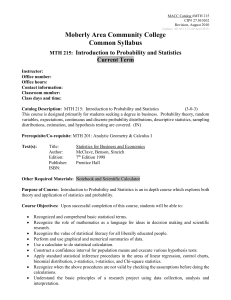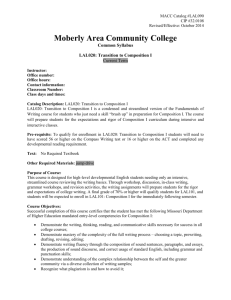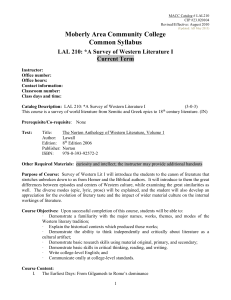IND 101 Fundamentals of Industrial Maintenance
advertisement
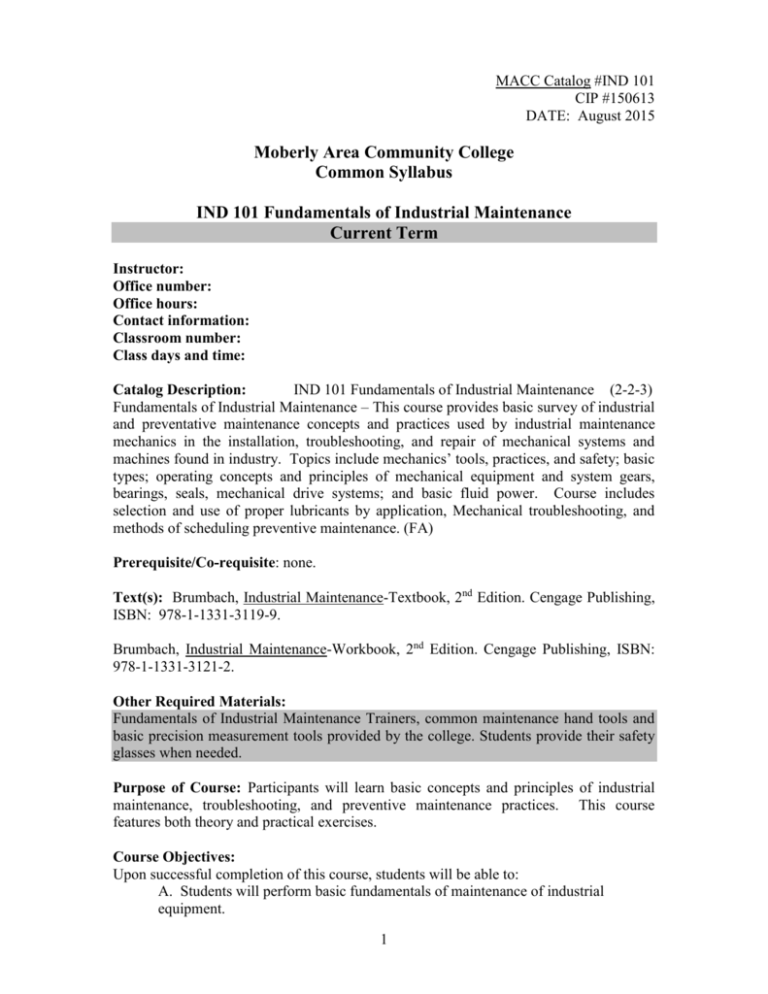
MACC Catalog #IND 101
CIP #150613
DATE: August 2015
Moberly Area Community College
Common Syllabus
IND 101 Fundamentals of Industrial Maintenance
Current Term
Instructor:
Office number:
Office hours:
Contact information:
Classroom number:
Class days and time:
Catalog Description:
IND 101 Fundamentals of Industrial Maintenance (2-2-3)
Fundamentals of Industrial Maintenance – This course provides basic survey of industrial
and preventative maintenance concepts and practices used by industrial maintenance
mechanics in the installation, troubleshooting, and repair of mechanical systems and
machines found in industry. Topics include mechanics’ tools, practices, and safety; basic
types; operating concepts and principles of mechanical equipment and system gears,
bearings, seals, mechanical drive systems; and basic fluid power. Course includes
selection and use of proper lubricants by application, Mechanical troubleshooting, and
methods of scheduling preventive maintenance. (FA)
Prerequisite/Co-requisite: none.
Text(s): Brumbach, Industrial Maintenance-Textbook, 2nd Edition. Cengage Publishing,
ISBN: 978-1-1331-3119-9.
Brumbach, Industrial Maintenance-Workbook, 2nd Edition. Cengage Publishing, ISBN:
978-1-1331-3121-2.
Other Required Materials:
Fundamentals of Industrial Maintenance Trainers, common maintenance hand tools and
basic precision measurement tools provided by the college. Students provide their safety
glasses when needed.
Purpose of Course: Participants will learn basic concepts and principles of industrial
maintenance, troubleshooting, and preventive maintenance practices. This course
features both theory and practical exercises.
Course Objectives:
Upon successful completion of this course, students will be able to:
A. Students will perform basic fundamentals of maintenance of industrial
equipment.
1
B. Students will develop preventative maintenance schedules.
C. Students will analyze equipment failures.
D. Students will perform troubleshooting and recognize
maintenance indicators
preventative
Course Content:
Students will be given reading assignments from the assigned texts and research from
internet resources. Lab assignments will be made from the training equipment manuals.
Students will be organized into teams for completion of laboratory exercises.
Statement to Connect Course with Technical Program Outcome Statement:
In compliance with MACC’s General Education outcomes, the student who successfully
completes this course will be able to:
I.
Demonstrate effective written and oral communication;
Assessment of Student Learning:
A. GRADE SCALE:
10% Quizzes
25% Activities (lab)
25% Mid-Term
25% Final Exam
15% Participation (homework)
A = 90-100%
B = 80-89%
C = 70-79%
D = 60-69%
F = 59 and below
B. EXAMS AND QUIZES: 60% of the final course grade will be based on exams and
quizzes. Periodic unannounced exams will be given. A mid-term and comprehensive
final exam will also be scheduled. Missed exams will not be made up except under
special conditions.
C. PARTICIPATION: Participation: Classroom participation is an important ingredient
of learning. Accordingly, participation by students in classroom discussion is encouraged
and will become an important of the final grade. Several opportunities will be provided
for students to contribute in a formal participation process via group participation and
presentation of written term papers.
D. OTHER METHODS OF ASSESSMENT: Teamwork is a valued work skill. To
this end, the class will be divided into teams for the purpose of completion of laboratory
exercises and formal after action reviews. Students will receive grades as a team for
their efforts in connection to the formal after action reviews.
Description of Major Assignment(s)/Project(s): Unannounced quizzes over questions
in the chapter review ill be given in class. Homework assignments will include: reading
the assigned chapter in the textbook and answer questions as per instruction. Mid-term
exam may consist of multiple choice, essay, selection, fill in the blank and/or a
combination of each type. Questions may be taken from review questions, instructor’s
lecture, and demonstrations. The exam will consist of 50 to 100 questions. Final exam
will be comprehensive in nature and follow the same guidelines as mid/term.
2
Statement to Connect Course with General Education Outcomes or Technical
Program Outcome Statement:
{Discipline-specific faculty will identify and state which (1 to 4) of the General
Education outcomes listed below applies to each course.}
In compliance with MACC’s General Education outcomes, the student who successfully
completes this course will be able to:
I.
Demonstrate effective written and oral communication skills;
II.
Demonstrate an understanding of scientific principles and computational skills
and how to use them to solve problems and make informed decisions;
III.
Develop a continuing appreciation for artifacts in language, art, music, or
philosophy and be able to evaluate those artifacts as representations of form,
cultural context, and individual expression; and
IV.
Demonstrate knowledge of how history has shaped society and culture,
understand how the individual relates to society and culture, appreciate
cultural diversity, understand human behavior and mental processes, and
understand human development.
Instructor Policies:
Academic Dishonesty: MACC board policy is as follows: “Academic dishonesty by
students damages institutional credibility and unfairly jeopardizes honest students;
therefore, it will not be tolerated in any form.” Forms of academic dishonesty include but
are not limited to the following: violations of copyright law, plagiarism, fabrication,
cheating, collusion, and other academic misconduct. Incidents of dishonesty regarding
assignments, examinations, classroom/laboratory activities, and/or the submission of
misleading or false information to the College will be treated seriously. The procedure
for handling academic dishonesty is outlined in the Student Handbook (Policy Handbook
M.010). In cases of alleged academic dishonesty, the burden of proof is on the student,
not on the instructor.
Attendance:
Any student who misses two consecutive weeks of class during a regular sixteen-week
semester or the equivalent proportion of class time during a shorter session will be
dropped from the class by the instructor unless acceptable justification is supplied.
Additionally, any student who misses more than one-fourth of the entire number of inseat class meetings in a regular 16-week semester or the equivalent proportion of class
time during a shorter session, may be dropped from that class by the instructor if, in the
opinion of the instructor, the student does not have reasonable opportunity to succeed in
the class. A student’s attendance rate will be calculated based upon the first day of
the semester (not the student’s date of enrollment in the course).
Student attendance must be defined in a different manner for online, hybrid, and virtual
courses. Student attendance in these courses is defined as active participation in the
3
course. Online, hybrid, and virtual courses will, at a minimum, have weekly mechanisms
for student participation, such as any or all of the following methods:
a. Completion of quizzes or exams
b. Submission of assignments
c. Participation in threaded discussions
d. Communication with the instructor
A student who does not participate in an online, hybrid, or virtual course for two
consecutive weeks will be dropped by the instructor unless acceptable justification is
supplied. As with ground courses, a student’s attendance rate in online courses will
also be calculated based upon the first day of the semester. If a student does not
demonstrate active participation in the online course within the first two weeks (or
the equivalent proportion of class time during a short session), the student will be
dropped as “never attended.” Simply logging into an online class does not constitute
active participation.
Students should be aware that their dropping a course and their last date of
attendance in the course may impact their financial aid.
Tardiness: per instructor’s policy
Make-up and late work: per instructor’s policy
Extra-credit work: per instructor’s policy
Schedule of Student Assignments/Activities:
Instructors will identify a Student Assignment/Activities schedule. Instructors have the
prerogative to construct the schedule by class periods, weeks, or an overview of topics to
be covered.
ADA Statement
Students who have disabilities that qualify under the Americans with
Disabilities Act may register for assistance through the Office of Access
and ADA Services. Students are invited to contact the Access Office to
confidentially discuss disability information, academic accommodations,
appropriate documentation and procedures. For more information, please
call either the Moberly office at (660) 263-4100 x 11240 or the Columbia
office at (573) 234-1067 x 12120, or visit our web page at
http://www.macc.edu/index.php/services/access-office.
Title IX Statement
MACC maintains a strict policy prohibiting sexual misconduct in any
form, including sexual harassment, sexual discrimination, and sexual
4
violence. All MACC employees, including faculty members, are
considered mandated reporters of sexual misconduct and as such are
expected to contact the Title IX Coordinator when they become aware, in
conversation or in writing, of an incident of sexual misconduct. For more
information on this policy or to learn about support resources, please see
http://www.macc.edu/sexual-misconduct-policy or contact Dr. Jackie
Fischer, MACC’s Title IX Coordinator, at 660-263-4110, ext. 11236 or
jackief@macc.edu.
5

